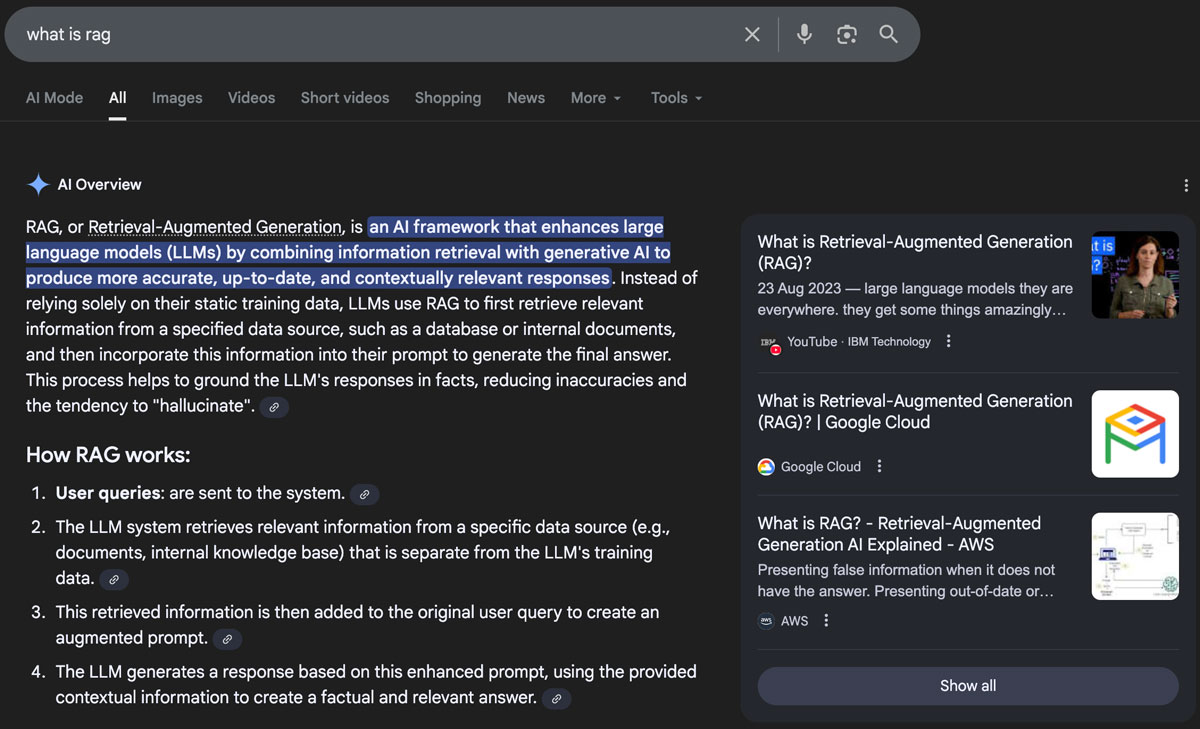If you’ve been following the shifts in SEO and digital marketing over the past year, you’ll know the ground is moving beneath our feet faster than ever. In 2024, AI search features like Google’s AI Overviews and Bing Copilot began to chip away at traditional click-through traffic. But in 2026, one technology is driving the most profound change yet: Retrieval-Augmented Generation (RAG).
As a digital marketing consultant, I work with small businesses who are feeling this shift directly. Their analytics dashboards are showing fewer visits from Google and other search engines, yet customer behaviour hasn’t slowed down. The answer lies in understanding how RAG works and what it means for your digital strategy.
In this article, I’ll break down what RAG is, why it matters, and – most importantly – what you as a business owner or marketer need to do to adapt.
What Is Retrieval-Augmented Generation (RAG)?
At its core, Retrieval-Augmented Generation is a simple but powerful idea: combine the knowledge of search engines with the language skills of AI.
Here’s how it works:
- Retrieval: The AI searches a database or the web for the most relevant documents.
- Generation: It then uses those documents to generate a natural, contextual, and accurate answer.
The goal? To reduce AI hallucinations and deliver better, fact-based responses.
For users, it feels seamless. You ask a question, and instead of being shown 10 blue links, you’re given a clear, sourced answer in natural language. For small businesses, however, this shift raises one very big question: what happens when customers no longer need to click through to your website?
How RAG Is Changing Search in 2026
Let’s be clear: RAG is not just another feature update. It’s a structural change in how people interact with information online.
- From links to answers: Search engines are moving away from being gateways and towards being answer engines. That means fewer opportunities for organic clicks.
- Reduced click-throughs: If Google’s AI Overview gives a complete answer, many users won’t feel the need to visit your site. This doesn’t mean your content isn’t valuable – it means the value is being captured at the search layer.
- Authority becomes the new currency: The content RAG retrieves depends on authority, trustworthiness, and relevance. If your site isn’t seen as authoritative, it won’t get pulled into AI-generated answers.
- Generative Engine Optimisation (GEO) is emerging: Just as SEO became a discipline for optimising visibility in Google’s rankings, GEO is about ensuring your content is retrievable and referenced by AI-driven systems.
This is where businesses that cling to outdated SEO tactics will fall behind, while those who adapt early will stand out.
The Impact on Content Creation
If you’ve been publishing generic, keyword-stuffed blog posts hoping to rank, the game is over. RAG doesn’t care about keyword density – it cares about usefulness and reliability.
Here’s how content strategy needs to evolve:
- Quality over quantity: Publishing 10 thin posts is no longer as effective as producing one in-depth, high-quality guide.
- First-hand experience wins: RAG values content backed by real expertise: case studies, original insights, customer examples. If you can show lived experience, you increase your chances of being retrieved.
- Structured content gets retrieved: FAQs, step-by-step guides, and schema-marked pages are easier for RAG models to recognise and pull into answers.
- Authority is everything: It’s not just about what you say, but whether your brand is trusted enough to be cited. Reviews, backlinks, and thought-leadership all feed into this.
What This Means for SEO Strategy
The fundamentals of SEO still matter – technical optimisation, backlinks, and keywords aren’t going anywhere. But the focus is shifting.
- From rankings to references: Being “position one” is less relevant if AI search provides the answer without a click. What matters is whether your content is retrieved and referenced by the AI itself.
- Entity-based optimisation: RAG relies on structured data and entities (people, places, companies). Ensuring your business is a clear, defined entity across the web will increase your visibility.
- New KPIs: Instead of tracking only organic sessions, we’ll start measuring “AI citations” – instances where your brand is mentioned or linked inside AI-generated answers.
This is a fundamental mindset shift: stop chasing rankings for their own sake, and start focusing on being the trusted source that AI draws from.
Action Plan: How to Adapt to RAG as a Small Business
Here’s what I recommend to clients who want to stay ahead:
- Audit Your Content for Authority and Trust: Is your site full of generic content, or do you offer real expertise? Update and consolidate thin posts into authoritative, data-rich resources.
- Create Retrieval-Friendly Content: Write structured content that’s easy for AI to parse. FAQs, tutorials, and schema-rich guides should be a core part of your strategy.
- Invest in Local SEO: RAG doesn’t ignore location. Optimise your Google Business Profile, collect reviews, and publish content that ties your business to its local area.
- Diversify Your Traffic Sources: Don’t rely solely on Google. Use LinkedIn, TikTok, YouTube, and email to engage your audience directly. That way, even if search clicks drop, your leads won’t.
- Build Your Brand Authority: Get featured on industry sites, collect testimonials, and position yourself as a thought leader. Authority signals will determine whether AI trusts you.
Case in Point
I recently worked with a professional services firm in Essex whose organic traffic have been constantly declining over the last 2 years. Instead of chasing lost rankings, we restructured their site into a retrieval-friendly knowledge hub. By combining GEO tactics with strong local SEO and a targeted Google Ads campaign, they not only regained visibility but also saw an increase in qualified leads even with lower raw traffic.
This is the future: fewer clicks, but more qualified engagement if you adapt the right way.
Conclusion
Retrieval-Augmented Generation is not the death of SEO – it’s its evolution. Search is moving from a game of chasing rankings to one of building trust, authority, and retrievability.
Small businesses that cling to the old playbook will see traffic continue to fall. But those who adapt by creating high-quality, retrieval-friendly content and investing in authority, will capture customer attention in new, powerful ways.
As an SEO consultant, my job is to help businesses like yours bridge this gap. If you’re ready to futureproof your digital marketing against RAG and AI-driven search, now is the time to act.



